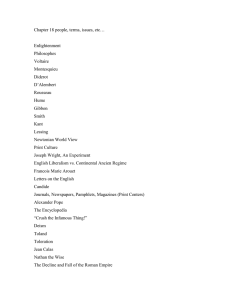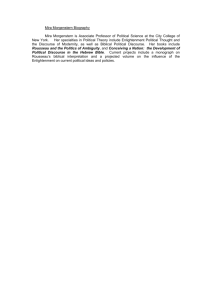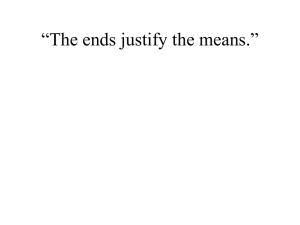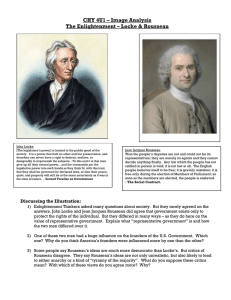Rousseau’s Political Philosophy Professor Flagg Taylor GO 351, Fall 2014
advertisement
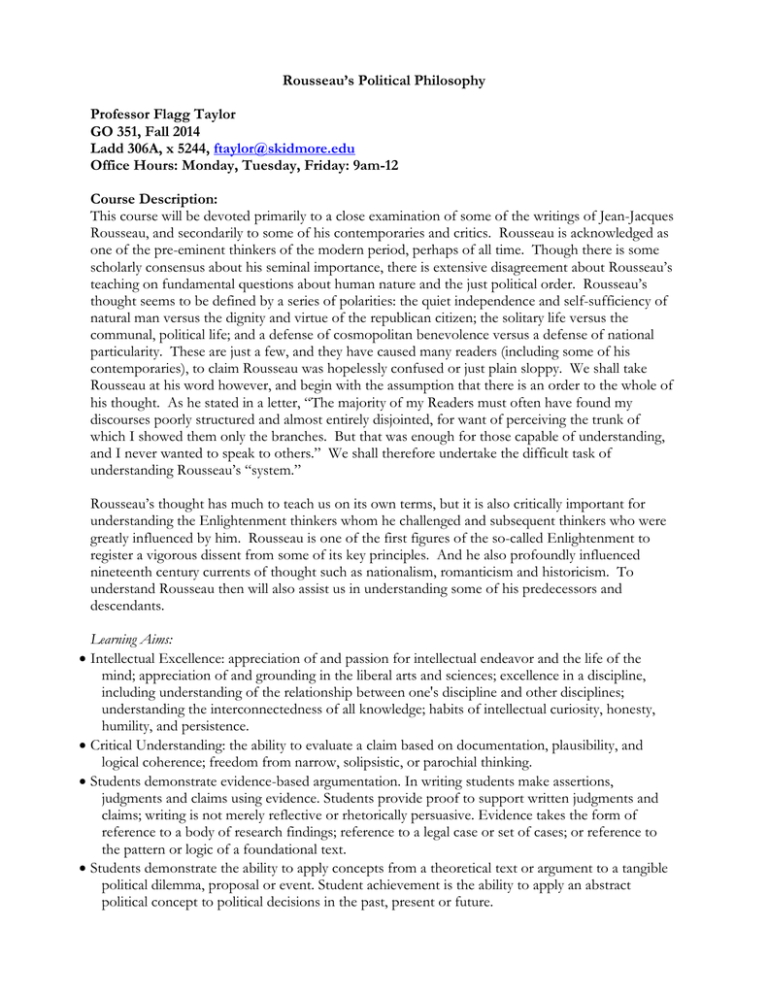
Rousseau’s Political Philosophy Professor Flagg Taylor GO 351, Fall 2014 Ladd 306A, x 5244, ftaylor@skidmore.edu Office Hours: Monday, Tuesday, Friday: 9am-12 Course Description: This course will be devoted primarily to a close examination of some of the writings of Jean-Jacques Rousseau, and secondarily to some of his contemporaries and critics. Rousseau is acknowledged as one of the pre-eminent thinkers of the modern period, perhaps of all time. Though there is some scholarly consensus about his seminal importance, there is extensive disagreement about Rousseau’s teaching on fundamental questions about human nature and the just political order. Rousseau’s thought seems to be defined by a series of polarities: the quiet independence and self-sufficiency of natural man versus the dignity and virtue of the republican citizen; the solitary life versus the communal, political life; and a defense of cosmopolitan benevolence versus a defense of national particularity. These are just a few, and they have caused many readers (including some of his contemporaries), to claim Rousseau was hopelessly confused or just plain sloppy. We shall take Rousseau at his word however, and begin with the assumption that there is an order to the whole of his thought. As he stated in a letter, “The majority of my Readers must often have found my discourses poorly structured and almost entirely disjointed, for want of perceiving the trunk of which I showed them only the branches. But that was enough for those capable of understanding, and I never wanted to speak to others.” We shall therefore undertake the difficult task of understanding Rousseau’s “system.” Rousseau’s thought has much to teach us on its own terms, but it is also critically important for understanding the Enlightenment thinkers whom he challenged and subsequent thinkers who were greatly influenced by him. Rousseau is one of the first figures of the so-called Enlightenment to register a vigorous dissent from some of its key principles. And he also profoundly influenced nineteenth century currents of thought such as nationalism, romanticism and historicism. To understand Rousseau then will also assist us in understanding some of his predecessors and descendants. Learning Aims: Intellectual Excellence: appreciation of and passion for intellectual endeavor and the life of the mind; appreciation of and grounding in the liberal arts and sciences; excellence in a discipline, including understanding of the relationship between one's discipline and other disciplines; understanding the interconnectedness of all knowledge; habits of intellectual curiosity, honesty, humility, and persistence. Critical Understanding: the ability to evaluate a claim based on documentation, plausibility, and logical coherence; freedom from narrow, solipsistic, or parochial thinking. Students demonstrate evidence-based argumentation. In writing students make assertions, judgments and claims using evidence. Students provide proof to support written judgments and claims; writing is not merely reflective or rhetorically persuasive. Evidence takes the form of reference to a body of research findings; reference to a legal case or set of cases; or reference to the pattern or logic of a foundational text. Students demonstrate the ability to apply concepts from a theoretical text or argument to a tangible political dilemma, proposal or event. Student achievement is the ability to apply an abstract political concept to political decisions in the past, present or future. Students demonstrate an in-depth, critical understanding of Rousseau’s texts on the formation of the state and the political community. Special attention will be given to developing your written and oral communication skills. Students will routinely engage in written work to enhance clarity and correctness. They will learn to identify and develop a central thesis and support that thesis with a number of ideas and arguments. Students will learn to link these ideas logically and to formulate appropriate transitions between arguments. Appropriate documentation will be required as will the necessity of upholding the standards of academic integrity. Students will also learn to communicate their ideas orally. They will gain the habit of asking pertinent and probing questions. Students will gain the ability to defend their assertions and interpretations with evidence gleaned from the texts. Clarity of expression will also be emphasized, as will the need for civility in the midst of disagreement. The small size of the seminar will allow for the sort of focused discussion where such goals can be met. Required texts and other readings: The Major Political Writings of Jean-Jacques Rousseau, translated and edited by John T. Scott Politics and the Arts: Letter to M. D’Alembert on the Theatre, ed. Allan Bloom The Philosophers’ Quarrel, Robert Zaretsky and John T. Scott David Hume’s Essays: Moral, Political, and Literary can be found here: http://www.econlib.org/library/LFBooks/Hume/hmMPL.html Adam Smith’s Theory of Moral Sentiments can be found here: http://www.econlib.org/library/Smith/smMS1.html d’Alembert’s Preliminary Discourse to the Encyclopedia can be found here: http://quod.lib.umich.edu/d/did/did2222.0001.083/--preliminarydiscourse?hi=0;rgn=main;view=fulltext;q1=preliminary+discourse Course Requirements: Textual Explication and Responses, 20% Essay #1, 25% Essay #2, 25% Final Exam, 30% Essays: These are formal essays where you are expected to have an identifiable thesis with arguments to support it. They should demonstrate a command of the text at hand, and a thoughtfulness about the claims made therein. I will hand out topics approximately two weeks before the essays are due. These are not research papers and you are not required to read any secondary literature. I want you to engage these authors directly. Final Exam: This will be a comprehensive, essay exam taken during the exam period. Attendance: After two absences, each absence will bring your final grade down by 5 points. Other requirements and expectations: You are expected to come to class having read the assigned texts with care. You will therefore be well equipped to comprehend the lecture as well as to contribute to the discussion. Course Outline: I. Virtue, History, and Human Nature: The Discourses A. First Discourse, On the question, “Whether the restoration of the Sciences and Arts has contributed to the purification of morals?” (read Zaretsky and Scott, ch. 2) 1. 1st D, Forward, Preface, begin Part I 9/8 2. 1st D , Part I 9/10 3. 1st D , Part II 9/15 4. Preface to Narcissus 9/17 Preface of a Second Letter to Bordes B. Responses (read Zaretsky and Scott, chs. 3-4) 1. David Hume, “Of the Rise and Progress of the Arts and Sciences,” “Of Commerce,” “Of Refinement in the Arts” 9/22 C. Second Discourse, On the Origins and Foundation of Inequality among Men 1. 2nd D, Epistle Dedicatory, Preface 9/24 2. 2nd D , pp. 61-75 9/29 3. 2nd D , pp. 75-90 10/1 4. 2nd D , pp. 90-104 10/6 5. 2nd D , pp. 104-END 10/8 D. Responses 1. Montaigne, “Of Cannibals,” Montesquieu, “On the Laws of Nature” from The Spirit of the Laws 10/13 2. Adam Smith, Letter to Edinburgh Review, “Of the Sense of Propriety,” from The Theory of Moral Sentiments 10/15 II. Principles of Politics A. Of the Social Contract 1. SC, Book I 10/20 2. SC , Book II 10/22 3. SC , Book III, chs. 1-7 10/27 4. SC , Book III, chs. 8-18 10/29 5. SC , Book IV 11/3 6. SC , Book IV 11/5 B. Response 1. Edmund Burke, from Reflections on the Revolution in France 11/10 2. David Hume, “Of the Original Contract” 11/10 III. Political Applications A. Letter to M. D’Alembert on the Theatre 1. LD, appendix; Preliminary Discourse to the Encyclopedia (d’Alembert) 11/12 2. LD, pp. 3-27 11/17 3. LD, pp. 27-57 11/29 4. LD, 57-75 11/24 THANKSGIVING BREAK 11/26-11/30 5. LD, pp. 75-113 12/1 6. LD, pp. 113-139 12/3 B. Responses 1. Adam Smith, “Of the Effect of Utility upon the Sentiment of Approbation,” and “Of the Influence of Custom and Fashion upon the Sentiments of Moral Approbation and Disapprobation” from The Theory of Moral Sentiments 12/8 2. Montesquieu, “On the Laws in their Relation with the Principles forming the General Spirit, the Mores, and the Manners of a Nation” from The Spirit of the Laws 12/10 Final Exam: Tuesday, December 16, 9am-12
